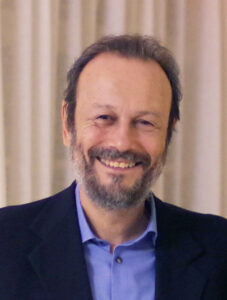Mavrothalassitis George
November 3, 2025 2025-11-03 11:50Mavrothalassitis George

Mavrothalassitis George
Professor of Medical Chemistry
Medical School, University of Crete, P.C. 70013 Heraklion, Crete
George Mavrothalassitis is Professor of Medical Chemistry in the Department of Basic Sciences of the Medical School of the University of Crete. His research activity spans a wide spectrum, from basic biochemistry to the development of animal models for the study of developmental diseases and cancers. His research focuses on the signaling regulation of transcription during normal development and disease and in particular on the role of ETS genes in development and cancer. Dr. Mavrothalassitis received his B.A. in Chemistry and his Ph.D. in Biochemistry from the Department of Chemistry of the Aristotle University of Thessaloniki. His postdoctoral research was conducted in Molecular Biology at the then newly established Institute of Molecular Biology and Biotechnology of FORTH and he subsequently worked as a visiting researcher at the Laboratory of Molecular Oncology of the National Cancer Institute (NCI) of the National Institutes of Health (NIH) of the USA. His work has been published in international scientific journals such as PNAS, MCB, JBC, EMBO J, Oncogene, Nature Genetics, etc., and he has received scholarships for doctoral and postdoctoral studies from the Hellenic Research Foundation, EMBO and the Fogarty Center of the USA.
1980-1984 PhD in Biochemistry, Department of Chemistry, Aristotle University of Thessaloniki
1976-1980 B.A. in Chemistry, Department of Chemistry, Aristotle University of Thessaloniki
Dr. Mavrothalassitis covers a wide range of topics focusing on the regulation and pathophysiology of ETS family transcription factors. In recent years, the laboratory has become a reference point for the pathophysiology of ERF and its role in developmental disorders of the hematopoietic and reproductive systems, musculoskeletal syndromes such as craniosynostosis, MIDES and Chitayat syndromes, and prostate cancer. At the same time, it develops approaches for the utilization and evaluation of ERF as a therapeutic target in the multitude of pathologies in which it participates.
GCS
AACR
ASM



